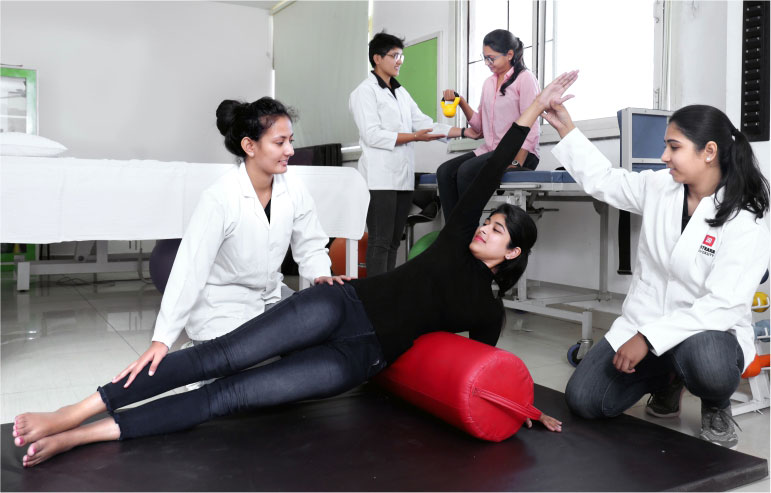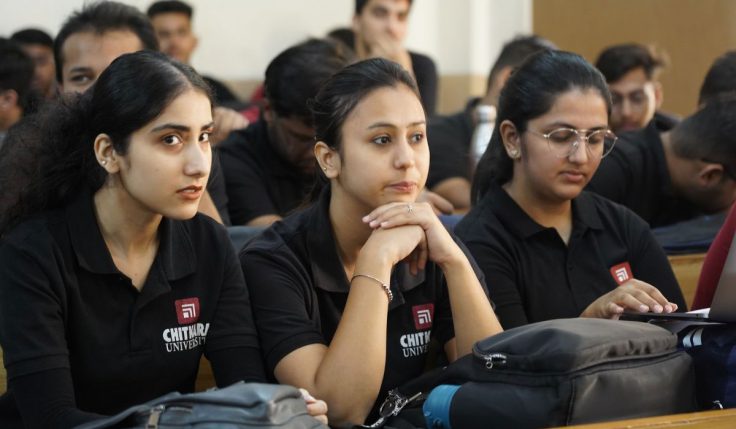With a comprehensive approach that considers a person’s mental, physical, psychological, and social well-being, physiotherapy is a field of allied health sciences that focuses on detecting movement abnormalities and enhancing the quality of life by restoring function and mobility. The goals of physiotherapy are to improve health, well-being, fitness, and the quality of life via evaluation, prevention, restoration, management, and rehabilitation of functional mobility.
You can enrol for one of the best physiotherapy courses in India at Chitkara University if you’re up for a demanding and rewarding job. Your desire to serve people will take precedence over your profession in physiotherapy. You would need to be patient, and diplomatic, have effective communication skills, problem-solving abilities, organisational skills, and time management skills in order to become a physiotherapist.
Bachelors in Physiotherapy:
The physiotherapy profession can be pursued after several educational levels, from undergraduate to post-doctoral, where the applicant can enrol themselves in both academic and research activities. A four-year (8 semesters) bachelor’s degree programme in physiotherapy is followed by a 6-month rotatory internship at a multispecialty hospital. While a Masters in Physiotherapy is a two-year degree programme (4 semesters), it offers concentration options in a variety of areas, including paediatrics, geriatrics, neurology, sports, and cardiac care.
Diploma in Physiotherapy:
Another excellent job option is a physiotherapy diploma. A student may enrol in the Bachelor of Physiotherapy programme after earning a diploma in physical therapy (BPT). After receiving a BPT, one may decide to pursue an MBA in Healthcare Management.
The capacity to treat and avoid issues that impair the physical functioning of the human body is acquired through a diploma in physiotherapy. Physiotherapy is a career that emphasises practical abilities, which perfectly combines art and science.
Eligibility to pursue Physiotherapy:
A passing grade of 50% on an intermediate test including Biology, Physics, and Chemistry as required topics is the minimal requirement to apply for the Bachelor of Physiotherapy programme. Similar to this, a candidate for a Master’s in Physiotherapy programme must get a Bachelor’s degree with a minimum of 50% from a reputable college after successfully completing a 6-month internship.
A student must pass the entrance exam offered by the university in order to be accepted into a good institution.
Course Structure for Physiotherapy and who should pursue:
An extensive understanding of the anatomy, physiology, and mechanics of the human system is a prerequisite for a bachelor’s degree in physiotherapy and BPT course. Students are taught the theoretical foundations of physiotherapy as well as the numerous therapeutic methods, such as exercise therapy, electrotherapy, manual therapy, etc. Students study musculoskeletal, sports, neurology, cardiopulmonary, paediatric, obs-gynecology, and geriatric diseases, illnesses, and injuries.
Students study surgical and non-surgical care while treating patients who need physical intervention in the ICU, IPD, or OPD. Other skills taught to students include administration, problem-solving, management, entrepreneurship, and ethics. With the mandatory submission of a research project, students also learn about innovation and research.
By restoring functional mobility, physiotherapists may significantly improve their patients’ quality of life while also improving their health and wellbeing. Members of society value and respect physiotherapists. People having empathy for those with physical disabilities can pursue physiotherapy at the best colleges in India. Chronic pain, sports injuries, and problems with function or movement can affect people of all ages, but they can all be significantly improved with the use of physiotherapy. People who are passionate about working as medical personnel in individual or team sports have a good possibility of finding work in this field.
Industry Demand and Scope:
The problem presently is at the level of prevention, management, and rehabilitation because of how complex people’s lifestyles have become. To enhance people’s well-being, physiotherapists collaborate with other health professionals or operate alone. That makes it one of the factors influencing candidates’ decision to pursue a profession in physiotherapy. Physiotherapists might be seen taking part in ergonomics, workplace health, and safety.
Depending on their interests, physiotherapy students might choose between clinical and non-clinical jobs. Students have the opportunity to work in a variety of specialisations after completing their courses, including neurorehabilitation, cardio-pulmonary rehabilitation, orthopaedic rehabilitation, paediatric population, obstetrics and geriatric clinics, and sports academies. Additionally, a physiotherapist may have the chance to collaborate with NGOs and social workers to help someone get qualified for vocational training. By creating their own clinical setting, they may also go into business for themselves.
A physiotherapist can also work for MNCs and other corporate organisations as a medical consultant or underwriter. The non-clinical fields where one may getjob with good pay ranging from 3.6 Lac to 9 Lac per year include clinicalinvestigators and medical coding.
The Key Takeaway:
After receiving their BPT, physiotherapy students have the option of continuing their studies at a higher level or specialising in the discipline. Graduates of the BPT programme can also enrol in postgraduate programmes in hospital administration, business management, public health management, and other fields.
The typical salary range for a physiotherapist employed by a hospital begins at a minimum of Rs. 5–6 lakhs annually. Depending on the job productivity and the sort of company they are working in, compensation rises with experience. Hence pursuing their physiotherapy degree from Chitkara University can aid as a great start for their career.






